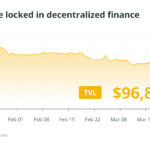The landscape of cryptocurrency regulation in the United States is undergoing a significant shift as the Federal Deposit Insurance Corp. (FDIC) has announced a major change in its approach to banks engaging in crypto-related activities. Previously, banks were required to obtain prior approval before entering the digital asset sector, a restriction that had effectively sidelined many institutions since its implementation in 2022. This abrupt departure from the norm was largely influenced by the FDIC’s desire to navigate the complexities of cryptocurrency regulation amidst rising concerns over security and stability in the financial system.
As the FDIC moves forward, the pressure has eased on banks seeking to explore the potential of cryptocurrencies. Acting Chairman Travis Hill emphasized that this new guidance represents a “turning of the page” and aims to align with enhanced safety measures without stifling innovation. This shift comes in the wake of President Donald Trump’s administration, which is increasingly seen as supportive of the crypto industry, promoting a more favorable climate for banks eager to engage with digital assets.
“With today’s action, the FDIC is turning the page on the flawed approach of the past three years,” said FDIC Acting Chairman Travis Hill.
The reversal of the pre-approval requirement signals a broader trend among U.S. banking regulators. Notably, the Office of the Comptroller of the Currency (OCC) has also recently rescinded its similar guidance. This change comes as federal regulators are attempting to strike a balance between encouraging innovation in finance while ensuring adequate protection against potential risks, especially in light of the turbulence faced by the industry in recent years, including the notable collapse of exchanges like FTX.
Support for the FDIC’s new direction has been echoed by officials within the White House, with digital assets adviser Bo Hines touting the move as a “huge step forward.” As the landscape continues to evolve, it is clear that a new chapter in the regulatory framework governing cryptocurrency is on the horizon, one that may redefine the relationship between banks and the digital asset economy.

The FDIC’s New Guidance on Crypto Activities
The FDIC has shifted its stance on bank participation in cryptocurrency activities, allowing for greater engagement without prior approvals. Here are the key points:
- Rescinding Pre-Approval Requirement:
- The FDIC will no longer require banks to obtain prior sign-off before engaging in crypto activities.
- This change comes after a prolonged period of uncertainty where banks were discouraged from entering the digital assets sector.
- Impact of Regulatory Changes:
- The shift in guidance is viewed as a response to the need for clearer policies governing bank involvement in cryptocurrencies.
- President Donald Trump’s administration has appointed crypto-friendly leadership at the FDIC and other financial bodies, influencing this policy change.
- Potential Benefits for Banks:
- With the removal of the pre-approval requirement, banks can now proceed with crypto-related initiatives while considering associated risks.
- This may foster innovation and expansion within the financial sector, potentially increasing competition and offering more services to consumers.
- Broader Regulatory Landscape:
- Other regulatory agencies, including the Federal Reserve and the Office of the Comptroller of the Currency, are also revising their stances on crypto.
- The OCC recently rescinded similar guidance, indicating a widespread shift in regulatory posture towards digital assets.
- Market Response:
- Industry leaders, such as Bo Hines from the White House, have reacted positively to the FDIC’s new guidance, indicating it as a significant advancement for the industry.
- This change may encourage investment in blockchain technologies, impacting technological advancements and economic growth.
Shifting Landscapes in Crypto Regulation: FDIC’s New Guidance
The recent decision by the Federal Deposit Insurance Corporation (FDIC) to eliminate the pre-approval requirement for banks engaging in crypto activities marks a significant turning point in the regulatory landscape. Unlike prior measures that kept banks on the sidelines as they awaited necessary approvals, this new directive encourages a more proactive approach. As the crypto sector continues to adapt to fluctuating regulatory pressures, it is essential to examine how this shift compares to similar developments within the financial oversight arena.
Competitive Advantages: One of the most notable advantages of the FDIC’s new guidance is the increased agility it provides to small and mid-sized banks. Without the burden of lengthy approval processes, these institutions can now more swiftly respond to market demands and opportunities within the burgeoning digital asset space. This flexibility is crucial, particularly as the crypto industry rapidly evolves and matures. Furthermore, the backing of a more crypto-enthusiastic leadership under President Trump could serve to bolster confidence among banks contemplating entry into the crypto market. By enabling banks to explore crypto opportunities more freely, the FDIC may also inspire greater innovation and competition among financial services firms.
Potential Disadvantages: However, this new approach is not without its drawbacks. The expedited access to crypto engagements could lead banks to underestimate the inherent risks associated with digital assets, especially considering recent high-profile failures and fraud within the sector. A lack of robust regulatory guidance might also foster an environment where some institutions engage in reckless practices, ultimately leading to financial instability. The FDIC’s shift could inadvertently accelerate the trend of ‘crypto debanking,’ where traditional financial institutions might distance themselves from digital currencies out of fear of regulatory fallout or public backlash.
This news could primarily benefit banks eager to expand into cryptocurrencies, as well as fintech companies looking to partner with traditional banks for crypto services. Conversely, the changes may create challenges for consumers and regulatory bodies tasked with monitoring the crypto landscape. As banks venture into this space, they may encounter backlash from consumers wary of the risks associated with cryptocurrency investments, especially if institutions mismanage their ventures. Additionally, regulators may find it difficult to keep pace with the rapid developments in the crypto market, raising concerns about whether adequate protections are in place for both financial institutions and their customers.
Broader Implications: The timing of the FDIC’s guidance aligns with broader trends in bank regulation, as seen with the Office of the Comptroller of the Currency (OCC) also rescinding its 2022 guidance on crypto engagement. With regulatory bodies moving towards more lenient stances, it will be interesting to observe how this reshaped environment affects banks’ appetite for risk and their approach to integrating digital assets into their portfolios. The crypto space is undoubtedly at a crossroads, where each regulatory shift could significantly influence its future trajectory.

















